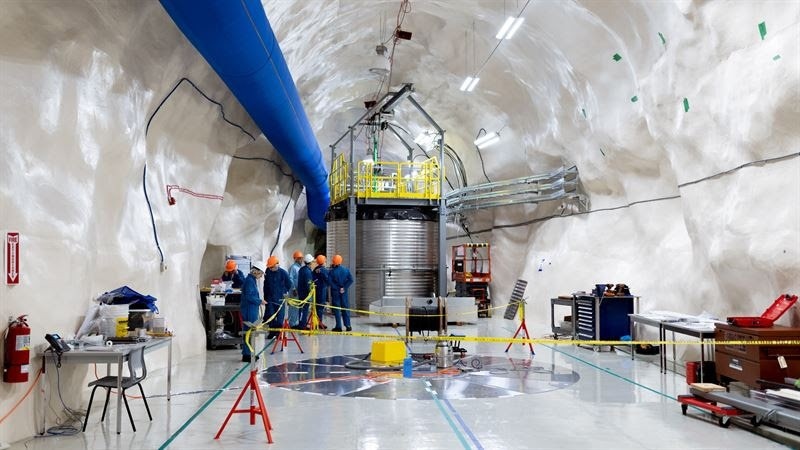Radiation from space is a challenge for quantum computers as their computation time becomes limited by cosmic rays. Researchers from Chalmers University of Technology, Sweden, and University of Waterloo in Canada are now going deep underground in the search for a solution to this problem – in a two-kilometer-deep mine.
 This is where the Swedish qubits are going | The Canadian underground laboratory SNOLAB has the world's lowest flux of muons – particles formed when cosmic rays reach the Earth's atmosphere – and advanced testing capabilities that make it an ideal location for research in quantum technology. Image Credit: Snolab
This is where the Swedish qubits are going | The Canadian underground laboratory SNOLAB has the world's lowest flux of muons – particles formed when cosmic rays reach the Earth's atmosphere – and advanced testing capabilities that make it an ideal location for research in quantum technology. Image Credit: Snolab
A recently discovered cause of errors in quantum computers is cosmic radiation. Highly charged particles from space disturb the sensitive qubits and cause them to lose their quantum state, as well as the ability to continue a calculation. But now quantum researchers from Sweden and Canada will join forces to find a solution to the problem – in the world's deepest located clean room, two kilometers underground.
“We are super excited about this project because it addresses the very important question of how cosmic radiation affects qubits and quantum processors. Gaining access to this underground facility is crucial to understanding how the effects of cosmic radiation can be mitigated,” says Per Delsing, Professor of Quantum Technology at Chalmers University of Technology, Sweden, and Director of the Wallenberg Center for Quantum Technology.
Canadian Shield Protects Against Cosmic Rays
The unique research project is carried out in collaboration between researchers from Chalmers University of Technology, the Institute for Quantum Computing (IQC) at the University of Waterloo, and SNOLAB near Sudbury, Ontario, Canada.
In the study, superconducting qubits manufactured at Chalmers University of Technology will first be tested above ground in both Sweden and Canada. Next, the same qubits will be tested far below the Canadian ground so that differences between the two environments may be studied. With the help of the two-kilometer-thick "ground shield" that surrounds the world’s deepest clean room located in the Vales Creighton mine in Ontario, the researchers may shut out cosmic rays or radioactivity that otherwise would have "knocked out" the qubits above ground.
“SNOLAB maintains the lowest muon flux* in the world and has advanced cryogenics testing capabilities, making it an ideal place to conduct valuable research on quantum technologies,” says Jeter Hall, Director of research at SNOLAB and Adjunct Professor at Laurentian University in Canada.
May Solve Error Correction Challenge
For the impact of quantum computers to be realised in society, quantum researchers first need to solve the issue of error correction. While classical computers use systems that can correct the errors that occur and provide reliable results, there are no current systems powerful enough to correct the significantly more complex errors that occur in quantum computers.
The error correction methods used on quantum computers today assume that each error caused by cosmic rays occurs independently of each other. This is an incorrect assessment, since these kinds of errors, on the contrary, usually correlate with each other. Current error correction methods cannot correct correlating errors, which means that multiple qubits can lose their quantum state at the same time. By increasing the understanding of the qubit processes, the researchers now want to find methods to reduce the number of correlated errors.
“With this project, we hope to start understanding what’s going on with the qubit decoherence in relation to cosmic rays, and then start understanding how the radiation affects the qubits in more controlled ways,” says Dr. Chris Wilson, Professor at the University of Waterloo and active at the Institute for Quantum Computing in Ontario.
* particles formed when cosmic rays reach the Earth's atmosphere.
More About the Research:
The project is carried out in collaboration between Chalmers University of Technology, the Institute for Quantum Computing (IQC) at the University of Waterloo, Ontario, Canada, and SNOLAB near Sudbury, Ontario, Canada.
The research project is funded by the grant "Advanced Characterization and Mitigation of Qubit Decoherence in a Deep Underground Environment", sponsored by the Army Research Office, U.S. Combat Capabilities Development Command's Army Research Laboratory.
Wallenberg Centre for Quantum Technology
The Wallenberg Centre for Quantum Technology is a twelve-year, billion-dollar initiative, largely funded by the Knut and Alice Wallenberg Foundation. Wacqt will take Sweden to the forefront of the rapidly growing field of quantum technology.
Through an extensive research program, Wacqt will develop and secure Swedish expertise in the four main areas of quantum technology: quantum computers and quantum simulators, quantum communication and quantum sensors.
Wacqt's main project is to develop and build a quantum computer that can solve problems far beyond the reach of today's best supercomputers.